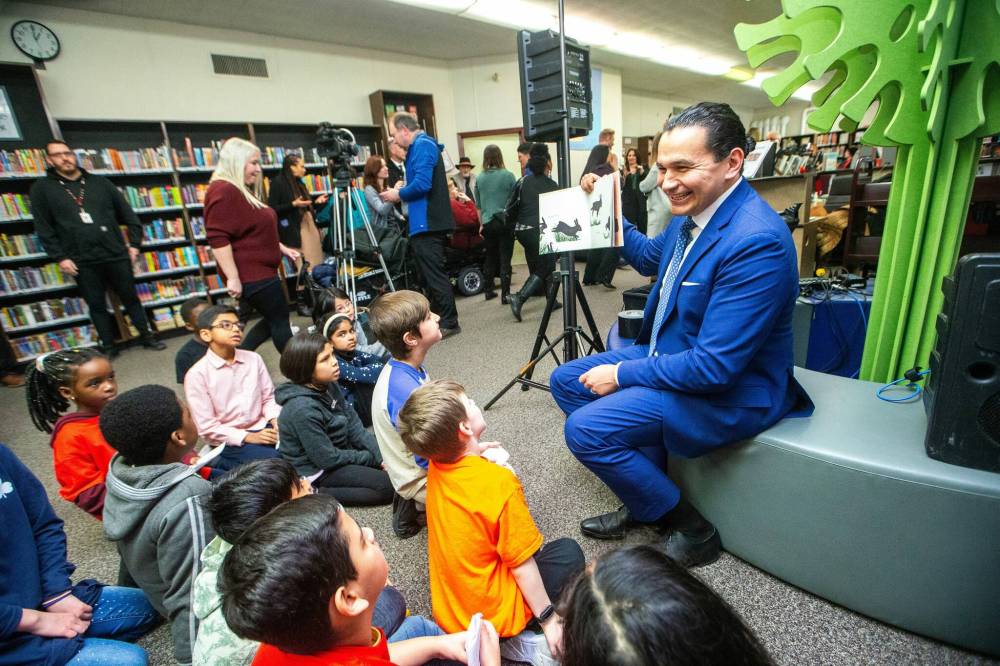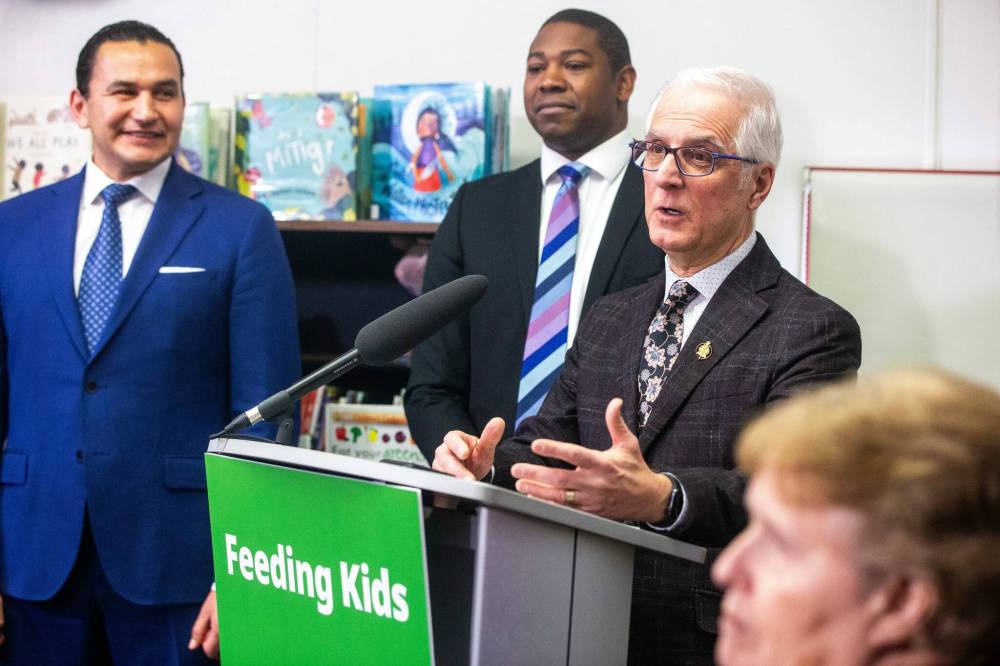School meal program on menu in Manitoba next fall
Advertisement
Read this article for free:
or
Already have an account? Log in here »
To continue reading, please subscribe:
Monthly Digital Subscription
$1 per week for 24 weeks*
- Enjoy unlimited reading on winnipegfreepress.com
- Read the E-Edition, our digital replica newspaper
- Access News Break, our award-winning app
- Play interactive puzzles
*Billed as $4.00 plus GST every four weeks. After 24 weeks, price increases to the regular rate of $19.95 plus GST every four weeks. Offer available to new and qualified returning subscribers only. Cancel any time.
Monthly Digital Subscription
$4.99/week*
- Enjoy unlimited reading on winnipegfreepress.com
- Read the E-Edition, our digital replica newspaper
- Access News Break, our award-winning app
- Play interactive puzzles
*Billed as $19.95 plus GST every four weeks. Cancel any time.
To continue reading, please subscribe:
Add Free Press access to your Brandon Sun subscription for only an additional
$1 for the first 4 weeks*
*Your next subscription payment will increase by $1.00 and you will be charged $16.99 plus GST for four weeks. After four weeks, your payment will increase to $23.99 plus GST every four weeks.
Read unlimited articles for free today:
or
Already have an account? Log in here »
Hey there, time traveller!
This article was published 30/01/2024 (723 days ago), so information in it may no longer be current.
The Manitoba government has promised to clear the wait list of schools in line for nutrition grants and roll out the country’s most comprehensive student meal program, starting in the next school year.
Premier Wab Kinew announced $30 million for a “universally accessible” kindergarten-to-Grade 12 nutrition program during a news conference at St. George School in Winnipeg on Tuesday.
“This is going to make kids happier. This is going to make kids healthier. This is going to make kids want to read more, do more math, get better report cards,” Kinew told a group of grade 3 and 4 students who were sitting cross-legged in their library for the event.

“Recess is going to be awesome. Lunchtime is going to be awesome. After-school sports, gym, music, everything’s going to be awesome if we (feed) more kids. Sounds like a good idea?”
The elementary students cheered in response to the announcement, which includes a combined $15 million for school divisions, based on enrolment and socioeconomic factors, and another $6 million for schools deemed the most needy.
The Manitoba Teachers’ Society, Child Nutrition Council of Manitoba and Breakfast Club of Canada have applauded the initiative, which was one of the NDP’s campaign promises during the Oct. 3 election.
A spokeswoman for Food Secure Canada’s Coalition for Healthy School Food called Manitoba’s plans “historic” and “visionary.”
“It’s really great that Manitoba is taking this lead. Parents are really suffering under an affordability crisis around food.”– said Debbie Field, spokeswoman for Food Secure Canada’s Coalition for Healthy School Food.
“It’s really great that Manitoba is taking this lead,” said Debbie Field, a national co-ordinator, when reached in Toronto. “Parents are really suffering under an affordability crisis around food; I’ve heard some polls suggest that even more stressful than high rents and housing is food costs.”
Field noted Canada is the sole G7 nation without a formal school meal program.
There is a growing movement to acknowledge students cannot learn when they are distracted by hunger and free food initiatives result in positive health outcomes and knowledge about nutrition, she said.
As part of its nutrition program expansion, the province will spend $9 million on grants that will be made available to schools on an application basis.
There is a patchwork of school breakfast, lunch and snack programs across the province at present. Principals typically apply for funding via school divisions, community organizations and the Child Nutrition Council of Manitoba.
The government-funded council currently has about 70 schools on its wait list.

An injection of $1.37 million, in turn increasing the nonprofit’s annual funding to $3.87 million, will both ensure schools on standby receive support and pay for a fourth staff dietitian.
The teachers society has long advocated for the introduction of a universal nutrition program to support learning and equity in classrooms.
Union leader Nathan Martindale said the stigma associated with accessing a meal program is reduced when initiatives are accessible and school-wide.
“If there’s more money available for more schools to access, that’s a good thing, but it’s also important that by September, children in every school in Manitoba will have access to healthy food,” Martindale said.
Wayne Ewasko, the new leader of the Progressive Conservatives, said he’s skeptical about the government’s description of the initiative.
“They’re changing their tune again a little bit on ‘access’ versus ‘universal.’…To me, universal means for absolutely everybody,” said the former education minister, who is also his party’s critic for the K-12 department.
Ewasko noted $30 million amounts to about $0.52 in nutrition funding per student per day when taking into account all 288,000 pupils in the province and the approximately 200 instructional days in each academic year.
“If there’s more money available for more schools to access, that’s a good thing, but it’s also important that by September, children in every school in Manitoba will have access to healthy food.”– Nathan Martindale, president of the Manitoba Teachers’ Society
There are more than 700 public schools in the province. The provincial nutrition council has supported about 300 of them so far in 2023-24.
Before Kinew and other government leaders arrived at St. George School to make the announcement, about 60 children gathered at collapsible tables set up in the building’s main hallway for a communal-style breakfast.
Staff served dozens of breakfast sandwiches — an original recipe from community liaison worker Joanne Hince, who doubles as the program’s head chef – featuring whole wheat english muffins, scrambled eggs, shredded cheese and green peppers.
“We want to serve them lots of fruits and vegetables, but with the cost increase at the store, sometimes we have to be creative,” said Hince, who has started substituting carrots in lieu of bags of apples to stretch the budget when the latter is not on sale.
Groceries cost at least five per cent more than they did this time last year in Manitoba, per the latest consumer price index report from Statistics Canada.
St. George School is projected to spend about $12,000 in 2023-24 to provide daily breakfast to students and make snacks available throughout the day at no charge via its community kitchen.
“There are some parents who say, ‘I don’t know what we’d do without you,’” Hince said, adding that students benefit from the socialization and education built into their food programming.
“It is more than just food; it’s like an onion — (the food in and of itself) is a layer of many things.”
maggie.macintosh@freepress.mb.ca

Maggie Macintosh
Education reporter
Maggie Macintosh reports on education for the Free Press. Originally from Hamilton, Ont., she first reported for the Free Press in 2017. Read more about Maggie.
Funding for the Free Press education reporter comes from the Government of Canada through the Local Journalism Initiative.
Every piece of reporting Maggie produces is reviewed by an editing team before it is posted online or published in print — part of the Free Press‘s tradition, since 1872, of producing reliable independent journalism. Read more about Free Press’s history and mandate, and learn how our newsroom operates.
Our newsroom depends on a growing audience of readers to power our journalism. If you are not a paid reader, please consider becoming a subscriber.
Our newsroom depends on its audience of readers to power our journalism. Thank you for your support.






